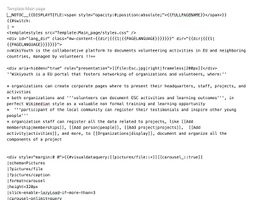Report from Volunteers Tbilisi
| Title | Report from Volunteers Tbilisi |
|---|---|
| Author | Lorenzo Gianni |
| Date | 2024-09-30 |
| Project | 2023-1-IT03-ESC51-VTJ-000139142 |
Tbilisi welcomed us in the summer months with its embracing heat and busy streets. Even on the sleepier days of the hottest weeks, the city is full of life and activities go on. Indeed, there is no shortage of associations that cater to those most in need, to provide help and sustenance.
Among the various organizations, we have been able to collaborate assiduously, starting in August 2024, with Volunteers Tbilisi. That organization is actually part of a larger network that aims to provide basic necessities for Ukrainian families who have fled the conflict.
Most of the volunteers at the distribution point, near the 300 Aragveli metro station, are Russian speakers, often from the Russian Federation or Ukraine, but there is also no shortage of volunteers from other countries such as Georgia, Belarus, the United States, and, of course, Italy.
Each of the people that is possible to meet at the center has their own story, and often, after just a few jokes, the volunteers open up and tell about their lives, what led them to move from their country, and what prompted them to offer their help for Ukrainian families. Not knowing Russian well, it is not super easy to communicate, yet sometimes all it takes is a few gestures, a few words in English or the help of an improvised translator.

While the stories have in common a certain sense of nostalgia for the country left behind and from the hardships suffered from the recent conflicts, the group is nonetheless always diverse and lively: cheering things up are often the animals, such as little Osty, the royal corgi of Maria, one of the volunteers, who frolics among the office rooms or the street cats who take refuge in the small back garden for some food and human warmth.
Activities at the distribution point usually begin around three in the afternoon, Thursday through Sunday, every other week. But as early as 2:30 p.m. it is possible to find a long line in front of the door, and so, inside, volunteers already start distributing the first materials. Each family is entitled to basic necessities, such as sugar, salt, soap, rice and other food items, diapers for the little ones,...

The first room is decorated with colourful drawings left there by the children who attend the center together with their families; they often have the colours of peace and depict their home of origin, as well as the country that hosted them. When the room is a bit emptier, the chairs on either side are used by both volunteers and families, and tea time becomes the perfect opportunity to tell each other the latest news, show photos of loved ones and exchange a few jokes. Attending these moments gives an idea of the importance of these contacts, and it gives back a lot, beyond the pure distribution of goods.

In passing the registration desks and shelves with food we exchange a few quick greetings with other volunteers, busy with distribution. Not infrequently Lana is there, introducing us to the day's activities, after inquiring about my week and asking me at least a couple of times if I would like something to drink.
In the back is another room, where volunteers divide up the goods to be packed, taken to the first room, or unloaded. There is always a lot going on, and someone occasionally turns on a small speaker to accompany the packing activity. The space is not much, and on the shelves are the boxes still full and the various packages to be distributed. Sitting there, all carrying out small gestures, there is a chance to exchange a few words, ask where the other volunteers are coming from, and improvise a few words of Russian.

The activities continue, until the center slowly empties out and calm slowly returns. Around six o'clock there is hardly anyone left in line, and the volunteers gather in the small kitchen to have something to eat. Occasionally preparing the meal is a Ukrainian lady, Irina, who bakes, among other things, delicious syrniki (sweet cheese pancakes, with raisins, apricots, and dried peaches).
She, too, moved to Georgia following the outbreak of the conflict and, as she told me, attends the center assiduously. As she kneads vigorously, she asks questions of all the volunteers, and is particularly curious about the “foreigners,” namely an American girl and me. Of course she chats quietly in Ukrainian and Russian, convinced that we can understand.
After we finish eating then, we tidy up the rooms, take a small inventory of the day's deliveries, and take a few ritual photos before saying our goodbyes.
Around seven o'clock the center closes. Leaving there, one accumulates the experiences of the people met, as well as their plans for the future, and there is a certain sense of precariousness thinking about their month-to-month plans, between donations, personal commitments and bureaucratic issues. But the sense of the small contribution made and the desire to come back and help also remains.









